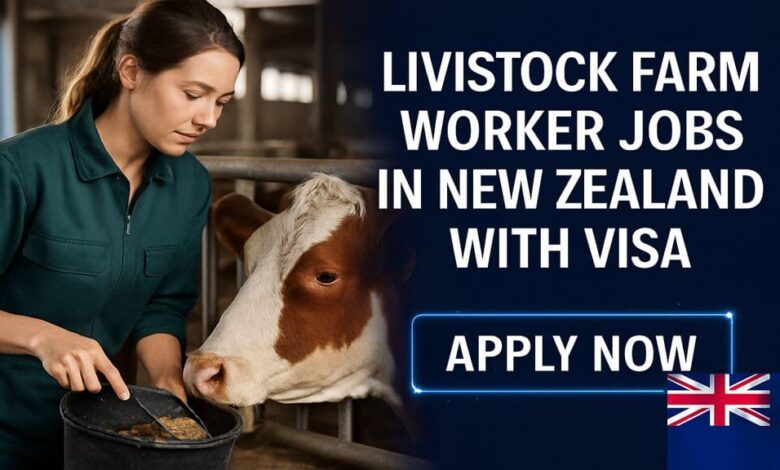Livestock Farm Worker Jobs in New Zealand with Visa 2026

Livestock Farm Worker Jobs in New Zealand with Visa Sponsorship offer an hourly wage of NZD $18 to $23 for full time or seasonal physical work in 2026 and are suitable for beginners with no formal experience as well as workers with basic farm exposure who want a fresh start, stable income, and a meaningful life working close to nature.
Details:
- Job Country: New Zealand
- Industry: Agriculture / Livestock
- Job Type: Full-time or Seasonal
- Experience Required: No formal experience necessary, but prior farm experience is an asset
- Education Required: Basic English proficiency
- Visa Sponsorship: Yes (RSE or Accredited Employer Work Visa)
- Accommodation: Often provided or subsidized
- Hourly Wage: NZD $18 to $23 (based on experience and contract type)
- Relocation Support: Available in many cases
Understanding Livestock Farming in New Zealand:
New Zealand farms are primarily focused on dairy, beef, and sheep farming. Workers play an essential role in maintaining animal health, managing feeding schedules, supporting breeding programs, and keeping facilities clean and compliant.
Employers such as Ngāi Tahu Farming—a respected Māori agribusiness—are known for integrating regenerative farming techniques, sustainability, and community-driven practices.
Check Also: Painter Jobs in New Zealand with Visa Sponsorship
Duties of Livestock Farm Worker Jobs in New Zealand:
Responsibilities vary depending on the farm’s size and focus, but may include:
- Feeding animals and ensuring access to clean water
- Monitoring animal health and reporting signs of illness
- Moving and handling livestock safely for milking or shearing
- Cleaning pens, sheds, and equipment
- Growing or harvesting animal feed
- Supporting breeding programs or seasonal lambing/calving
- Participating in innovative systems like solar-powered cow tracking (e.g., Halter technology)
Requirements and Preferred Qualities:
While formal education is not typically required, candidates should have:
- A strong work ethic and physical fitness
- Basic communication in English
- Willingness to work outdoors in variable weather
- Enthusiasm for farming, animals, or regenerative agriculture
- Readiness to undergo background checks or drug/alcohol testing
- An interest in learning te reo Māori and New Zealand farm practices (optional but valued by Ngāi Tahu)
Visa Sponsorship Pathways:
There are two primary visa pathways for foreign farm workers:
1. Recognized Seasonal Employer (RSE) Visa
- For seasonal work (up to 7 months per year)
- Open to applicants from specific countries
- Sponsored directly by approved employers
Eligible RSE countries include:
India, Pakistan, Nigeria, Ghana, South Africa, Fiji, Samoa, Tonga, Solomon Islands, Kiribati, Nauru, Papua New Guinea, Micronesia, and others.
More info: Recognised Seasonal Employer scheme
2. Accredited Employer Work Visa (AEWV)
- For longer-term roles and full-time jobs
- Employer must be officially accredited by Immigration NZ
- Suitable for Dairy Assistants and Livestock Workers with full-time contracts
More info: Accredited Employer Work Visa
Benefits of Livestock Farm Worker Jobs in New Zealand:
1. Visa Sponsorship and Pathway to Residency
- Work Legally in New Zealand: Many employers sponsor work visas under programs like the Accredited Employer Work Visa (AEWV).
- Permanent Residency Options: Farm jobs can lead to residence through programs like the Green List, Regional Skills Shortage List, or other immigration pathways.
2. Stable Employment in a High-Demand Sector
- Consistent Job Demand: New Zealand’s strong agricultural sector ensures stable and year-round employment opportunities.
- Essential Worker Roles: Livestock workers are considered essential in food supply chains, providing better job security.
3. Attractive Compensation and Benefits
- Competitive Wages: Livestock farm workers typically earn NZD 25–30 per hour, depending on experience and region.
- Accommodation Provided: Many employers offer on-site housing or rent subsidies, reducing living costs significantly.
- Additional Perks: Some roles include free meals, transport assistance, or bonuses for long-term contracts.
4. Skill Development and Training
- Hands-On Experience: Workers gain valuable skills in animal care, farm machinery operation, and pasture management.
- Career Progression: Opportunities exist to grow into supervisory or farm management roles with experience and training.
5. Work-Life Balance and Lifestyle
- Rural Living Experience: Enjoy peaceful rural environments with access to nature, low crime rates, and community life.
- Healthy Lifestyle: Physical, outdoor work in a clean and green country contributes to overall well-being.
6. Supportive Work Environment
- Cultural Diversity: New Zealand farms employ workers from various countries, fostering inclusive workplaces.
- Employer Assistance: Many employers help with relocation logistics, visa processing, and settling in.
Farm Worker Immigration to New Zealand:
New Zealand’s agricultural sector plays a vital role in the country’s economy, and there’s a growing demand for skilled and seasonal labor in rural areas. If you’re interested in farm worker immigration to New Zealand, there are several pathways for international workers to secure employment on livestock farms, gain valuable experience, and potentially qualify for long-term stay or residency.
This guide outlines options for seasonal work on livestock farms in NZ, details about NZ work visas for farm workers, and the best regions for finding New Zealand farms hiring overseas workers.
Farm Worker Immigration New Zealand:
New Zealand actively recruits overseas workers to meet the labor demands of its farming industry. With ongoing skilled worker shortages in NZ agriculture, foreign workers are encouraged to apply for both temporary and long-term roles.
There are several ways to immigrate or work temporarily as a farm worker in New Zealand, including:
- Seasonal work visas
- Working holiday schemes
- Accredited Employer Work Visa (AEWV)
- Skilled Migrant Category (SMC) for experienced agricultural workers
Seasonal Work on Livestock Farms in NZ:
Many livestock farms in New Zealand require seasonal labor during peak times such as lambing, calving, shearing, and general farm maintenance.
Key points:
- Seasonal contracts typically last 3–6 months
- Common roles include animal handling, feeding, fencing, milking, and general labor
- Many positions are located in remote or rural parts of New Zealand
- Previous experience with livestock is often preferred but not always required
These roles are often filled through the Working Holiday Visa or the Recognised Seasonal Employer (RSE) scheme, although the latter mainly applies to horticulture and viticulture sectors.
New Zealand Rural Employment and Agriculture Industry:
New Zealand rural employment spans a wide range of roles in dairy, sheep, beef, and deer farming. With the shift toward modernized, high-volume farming, there’s increasing demand for:
- Stock managers
- Farm assistants
- Herd technicians
- Tractor/machinery operators
- Shepherds and fencers
The country’s rural economy is heavily dependent on these workers, making farm jobs in New Zealand a viable route for employment-based migration.
NZ Work Visa for Farm Workers:
The Accredited Employer Work Visa (AEWV) is now the main pathway for international workers seeking employment in New Zealand’s agricultural sector.
To qualify, you need:
- A full-time job offer from an accredited New Zealand employer
- A role that meets wage and job description requirements
- Proof of relevant experience or qualifications (for skilled positions)
- A clean criminal record and medical clearance
The AEWV can lead to residency options for eligible candidates working in roles on the Green List, which includes certain agricultural jobs.
Working Holiday Farm Jobs NZ:
Young travelers (usually aged 18–30 or 35 depending on nationality) can apply for a Working Holiday Visa and take up farm jobs in NZ as part of their travel and work experience.
Benefits of working holiday farm jobs NZ:
- Flexible, short-term contracts
- Great for backpackers or gap year travelers
- Exposure to rural life and New Zealand farming culture
- No prior experience required for many entry-level roles
Farm work is commonly available on dairy farms, sheep stations, and mixed-crop livestock farms across the country.
Skilled Worker Shortage in NZ Agriculture:
There is a persistent skilled worker shortage in NZ agriculture, particularly in dairy farming, sheep shearing, and livestock management.
The shortage list includes roles such as:
- Dairy farm managers
- Agricultural equipment operators
- Livestock technicians
- Senior farm workers
These occupations are considered essential, and immigration policy favors candidates with relevant experience and training. This opens up opportunities for permanent migration under the Skilled Migrant Category or the AEWV to residency pathway.
Best Regions in New Zealand for Livestock Farm Jobs:
If you’re searching for the best regions in New Zealand for livestock farm jobs, consider the following areas known for their strong farming economies:
- Canterbury: Large-scale dairy and sheep farms
- Waikato: One of the largest dairy-producing regions in NZ
- Southland: Known for sheep farming and high rainfall pastures
- Taranaki: Strong dairy industry with smaller, family-run farms
- Otago: Mix of sheep stations and beef farms
- Manawatū-Whanganui: Diverse agriculture with many job openings
These regions consistently have New Zealand farms hiring overseas workers, especially during peak seasons.
New Zealand Farms Hiring Overseas Workers:
If you’re looking for New Zealand farms hiring overseas workers, here’s how to find opportunities:
- Check job boards like Seek, TradeMe Jobs, and Rural Exchange (REX)
- Apply directly to accredited farm employers
- Connect with recruitment agencies specializing in agricultural placements
- Explore government-approved relocation and visa programs
Employers must be Immigration NZ-accredited to sponsor foreign workers under the AEWV or other work visa categories.
Who Can Apply?
You may be eligible to apply if you are:
- From a country listed under the RSE visa program (for seasonal jobs)
- Sponsored by an accredited New Zealand employer (for full-time roles)
- In good health and can pass police and background checks
- Ready to relocate and legally permitted to work in agriculture
How to Apply for Livestock Farm Worker Jobs in New Zealand with Visa?
Follow these steps:
- Search for Approved Jobs
Use these platforms to find livestock or dairy jobs with visa sponsorship: - Tailor Your Resume
- Highlight any agricultural or livestock experience
- Mention your ability to relocate and work legally in NZ
- Include references or certifications, if available
- Contact Employers or Recruiters
- Apply directly or via a recruiter approved by Immigration NZ
- Ask whether the employer is accredited and offers visa sponsorship
- Complete the Visa Application Process
- Work with the employer to obtain the correct visa
- Submit required documents (ID, police check, health info, job offer letter)
Final Thoughts:
Livestock farming jobs in New Zealand provide valuable international work experience, reliable income, and a chance to contribute to one of the world’s most innovative agricultural sectors. Whether you’re starting out or bringing years of farming experience, New Zealand offers clear pathways for visa sponsorship and long-term employment.
Frequently Asked Questions:
What does a livestock farm worker do in New Zealand?
A livestock farm worker assists in the daily care and management of animals such as cattle, sheep, and pigs. Tasks include feeding, herding, health monitoring, cleaning animal areas, and maintaining equipment and fences.
What type of visa is needed for livestock farm work in New Zealand?
Most foreign workers apply for the Accredited Employer Work Visa (AEWV). The job offer must be from an employer accredited by Immigration New Zealand.
Are livestock farm jobs in New Zealand open to foreign workers?
Yes. Due to labor shortages in agriculture, many New Zealand employers actively recruit foreign workers and offer visa sponsorship through the Accredited Employer Work Visa (AEWV).



